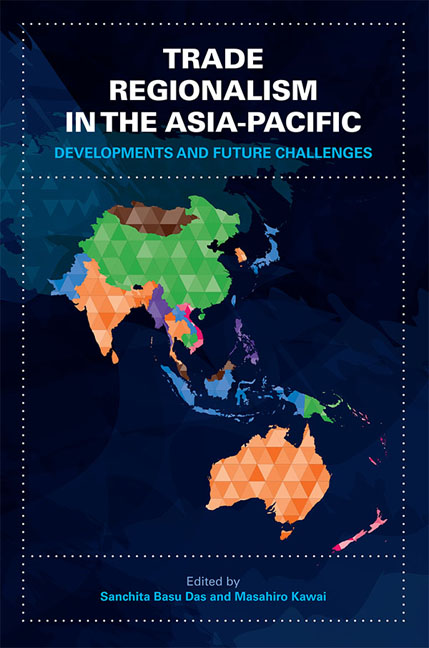Book contents
- Frontmatter
- Contents
- Foreword
- Acknowledgments
- List of Abbreviations
- The Contributors
- 1 Introductory Overview — Trade Regionalism in the Asia-Pacific: Developments and Future Challenges
- I The Trans-Pacific Partnership (TPP) Agreement
- II The Regional Comprehensive Economic Partnership (RCEP) Agreement
- III Regional Economic Integration: A Multi-stage Approach
- IV Old and Emerging Approaches to Asia-Pacific Regional Integration
- V Asia-Pacific Regional Integration: Towards Convergence?
- Index
Foreword
Published online by Cambridge University Press: 05 July 2016
- Frontmatter
- Contents
- Foreword
- Acknowledgments
- List of Abbreviations
- The Contributors
- 1 Introductory Overview — Trade Regionalism in the Asia-Pacific: Developments and Future Challenges
- I The Trans-Pacific Partnership (TPP) Agreement
- II The Regional Comprehensive Economic Partnership (RCEP) Agreement
- III Regional Economic Integration: A Multi-stage Approach
- IV Old and Emerging Approaches to Asia-Pacific Regional Integration
- V Asia-Pacific Regional Integration: Towards Convergence?
- Index
Summary
Masahiro Kawai, Professor at the Graduate School of Public Policy, University of Tokyo and Sanchita Basu Das, Fellow at ISEAS–Yusof Ishak Institute, have brought together a valuable collection of short papers written by leading thinkers on the subject of regional economic cooperation. I congratulate all the authors and editors for their contribution to the current debate on the Asia-Pacific regionalism.
Regional Trade Agreements (RTAs) have been proliferating in the Asian region in the post-Cold War period, especially after multilateral trade talks led by the World Trade Organization (WTO) and the Asia-Pacific Economic Cooperation (APEC) stalled. These RTAs are seen as alternative paths for trade liberalization and cooperation. Southeast Asia countries are strong proponents of this approach. Pushing first for the ASEAN Free Trade Area, and more recently the ASEAN Economic Community, individual ASEAN member countries are also pursing separate Free Trade Agreements (FTAs) among “like-minded” partners across Asia and the Pacific-Rim nations.
Against this backdrop of a growing number of economic cooperation arrangements, governments started to explore options for a consolidated and coherent Asia-Pacific trading architecture. This has led to the development of two mega-regionals, namely the Trans-Pacific Partnership (TPP) and the Regional Comprehensive Economic Partnership (RCEP), the former spearheaded by the United States, and the latter by ASEAN. Meanwhile, a Free Trade Area of the Asia-Pacific (FTAAP), first discussed in APEC meetings in 2004, has been revitalized after China restarted the discussion again in 2014 at the APEC Leaders’ Meeting that year.
This book volume is a timely contribution to the on-going deliberations on the Asia-Pacific regional cooperation. It provides analytical discussions at four levels. First, the publication discusses in detail the two mega-regionals, the TPP and the RCEP, that are ongoing at this moment. Second, it examines the feasibility of the ASEAN Economic Community and the China–Japan–Korea Trilateral Agreement serving as building blocks for the more comprehensive agreements in Asia. Third, it sheds light on the other regionals, like the Asia-Pacific Economic Cooperation (APEC), the Transatlantic Trade and Investment Partnership (TTIP) and the Pacific Alliance (PA), and examines their potential for linking the Pacific and Asia. Lastly, the publication examines the possibility for a FTAAP and its implications for the WTO.
- Type
- Chapter
- Information
- Trade Regionalism in the Asia-PacificDevelopments and Future Challenges, pp. vii - viiiPublisher: ISEAS–Yusof Ishak InstitutePrint publication year: 2016



